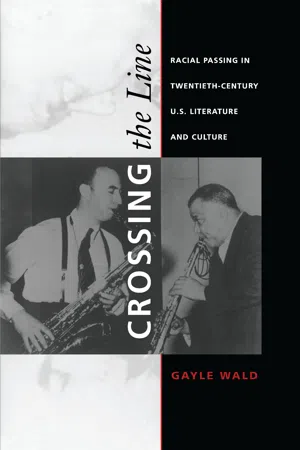
Crossing the Line
Racial Passing in Twentieth-Century U.S. Literature and Culture
- English
- PDF
- Available on iOS & Android
Crossing the Line
Racial Passing in Twentieth-Century U.S. Literature and Culture
About This Book
As W. E. B. DuBois famously prophesied in The Souls of Black Folk, the fiction of the color line has been of urgent concern in defining a certain twentieth-century U.S. racial "order." Yet the very arbitrariness of this line also gives rise to opportunities for racial "passing, " a practice through which subjects appropriate the terms of racial discourse. To erode race's authority, Gayle Wald argues, we must understand how race defines and yet fails to represent identity. She thus uses cultural narratives of passing to illuminate both the contradictions of race and the deployment of such contradictions for a variety of needs, interests, and desires.
Wald begins her reading of twentieth-century passing narratives by analyzing works by African American writers James Weldon Johnson, Jessie Fauset, and Nella Larsen, showing how they use the "passing plot" to explore the negotiation of identity, agency, and freedom within the context of their protagonists' restricted choices. She then examines the 1946 autobiography Really the Blues, which details the transformation of Milton Mesirow, middle-class son of Russian-Jewish immigrants, into Mezz Mezzrow, jazz musician and self-described "voluntary Negro." Turning to the 1949 films Pinky and
Lost Boundaries, which imagine African American citizenship within class-specific protocols of race and gender, she interrogates the complicated representation of racial passing in a visual medium. Her investigation of "post-passing" testimonials in postwar African American magazines, which strove to foster black consumerism while constructing "positive" images of black achievement and affluence in the postwar years, focuses on neglected texts within the archives of black popular culture. Finally, after a look at liberal contradictions of John Howard Griffin's 1961 auto-ethnography Black Like Me, Wald concludes with an epilogue that considers the idea of passing in the context of the recent discourse of "color blindness."
Wald's analysis of the moral, political, and theoretical dimensions of racial passing makes Crossing the Line important reading as we approach the twenty-first century. Her engaging and dynamic book will be of particular interest to scholars of American studies, African American studies, cultural studies, and literary criticism.
Frequently asked questions
Information
Table of contents
- CONTENTS
- Preface
- Acknowledgments
- Introduction: Race, Passing, and Cultural Representation
- Chapter 1. Home Again: Racial Negotiationsin Modernist African American Passing Narratives
- Chapter 2. Mezz Mezzrow and theVoluntary Negro Blues
- Chapter 3. Boundaries Lost and Found: Racial Passing and Cinematic Representation, circa 1949
- Chapter 4. ‘I’m Through with Passing’’:Postpassing Narratives in Black Popular Literary Culture
- Chapter 5. ‘‘A Most Disagreeable Mirror’’:Reflections on White Identityin Black Like Me
- Epilogue: Passing, ‘‘Color Blindness,’’ and Contemporary Discourses of Race and Identity
- Notes
- Bibliography
- Index